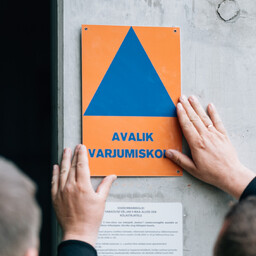Soomes on varjendeid peaaegu kõigile. 5,5 miljonist elanikust saab 4,8 miljonit inimest
hädaolukorras
varjendisse minna. Helsingis on varjendeid rohkem kui elanikke. See tähendab, et
kriisi korral
on ruumi ka turistidele ja
võõrtööjõule
.
hädaolukorras
Tõlge fraasile: hädaolukorras
EN
in an emergency
kriisi korral
Tõlge fraasile: kriisi korral
EN
in case of crisis
võõrtööjõule
Tõlge fraasile: võõrtööjõule
EN
for foreign workers
Soome on ehitanud varjendeid juba 80 aastat. Nende riigis on üle 50 000 varjendi. See on suur number ja nende
investeeringud
on olnud suured.
investeeringud
Tõlge fraasile: investeeringud
EN
investments
Eestis on varjendeid palju vähem. Praegu on neid üle Eesti 270. Need mahutavad umbes 230 000 inimest ehk 17%
elanikkonnast
. Eesti on jäänud maha ka Lätist ja Leedust. Nendes riikides on juba
kehtivad seadused
, mis kohustavad ehitama varjendeid uutesse hoonetesse.
elanikkonnast
Tõlge fraasile: elanikkonnast
EN
of the population
kehtivad seadused
Tõlge fraasile: kehtivad seadused
EN
valid laws
Soomes kasutatakse ära ka vanu
sõjaaegseid varjendeid
. Neid
renoveeritakse ja hooldatakse
. See on odavam kui uute ehitamine. Eestis on nõukogudeaegsed varjendid sageli
halvas seisus
ja
ebasoodsates kohtades
.
sõjaaegseid varjendeid
Tõlge fraasile: sõjaaegseid varjendeid
EN
wartime shelters
renoveeritakse ja hooldatakse
Tõlge fraasile: renoveeritakse ja hooldatakse
EN
renovated and maintained
halvas seisus
Tõlge fraasile: halvas seisus
EN
in poor condition
ebasoodsates kohtades
Tõlge fraasile: ebasoodsates kohtades
EN
in unfavorable locations
Euroopa Liit
pakub riikidele raha varjendite ehitamiseks. Eesti saab sellest rahast 200 miljonit eurot. Lisaks on võimalik kasutada
riigi ja omavalitsuste toetusi
.
Euroopa Liit
Tõlge fraasile: Euroopa Liit
EN
European Union
riigi ja omavalitsuste toetusi
Tõlge fraasile: riigi ja omavalitsuste toetusi
EN
state and local government support
Elamikkonnakaitse tähtsusest mõistetakse üha rohkem. Euroopa riikide siseministrid tegutsevad koos, et parandada
kriisivalmidust
. Tallinna, Riia ja Vilniuse linnad on alustanud
tihedamat koostööd
kodanikukaitses.
kriisivalmidust
Tõlge fraasile: kriisivalmidust
EN
crisis preparedness
tihedamat koostööd
Tõlge fraasile: tihedamat koostööd
EN
closer cooperation
In Finland, shelters are available for almost everyone. Out of 5.5 million inhabitants, 4.8 million people can go to a shelter in an emergency. Helsinki has more shelters than residents. This means that in a crisis, there is also room for tourists and foreign workers.
Finland has been building shelters for 80 years. There are over 50,000 shelters in the country. This is a large number, and their investments have been significant.
In Estonia, there are far fewer shelters. Currently, there are 270 shelters across Estonia. They can accommodate about 230,000 people, or 17% of the population. Estonia has also fallen behind Latvia and Lithuania. In these countries, there are already laws in place that require the construction of shelters in new buildings.
In Finland, old wartime shelters are also utilized. They are renovated and maintained. This is cheaper than building new ones. In Estonia, Soviet-era shelters are often in poor condition and located in unfavorable places.
The European Union provides funding to countries for the construction of shelters. Estonia will receive 200 million euros from this fund. In addition, it is possible to use state and local government support.
The importance of civil protection is increasingly understood. The interior ministers of European countries are working together to improve crisis preparedness. The cities of Tallinn, Riga, and Vilnius have started closer cooperation in civil protection.

